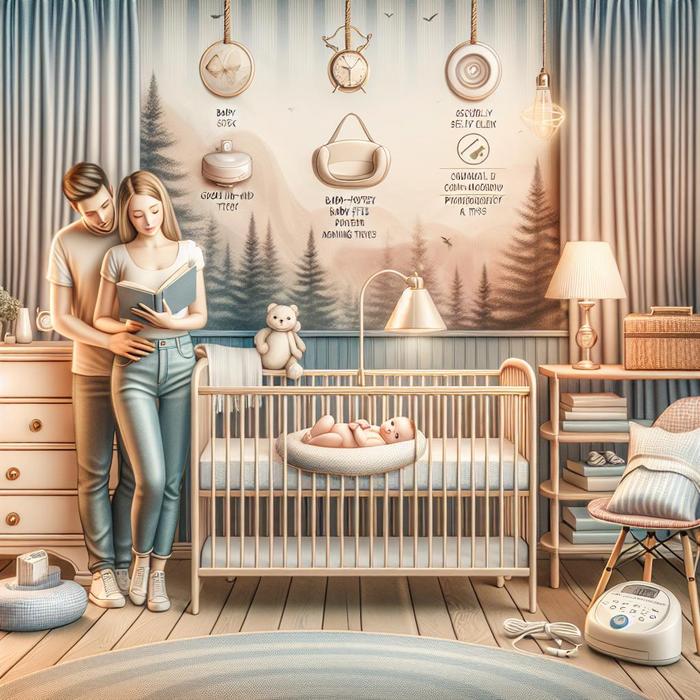Understanding the Importance of Newborn Safety
As a new parent, ensuring your newborn’s safety is paramount. The joy of welcoming a new baby into your home can sometimes be tempered with anxiety about creating a safe environment. This is where a comprehensive baby safety checklist becomes an invaluable tool. It will guide you as you safeguard your home, making it a safe haven for your precious little one.
Your First Line of Defense: Babyproofing
Babyproofing is a crucial element of newborn safety. This is because as your baby starts to roll, crawl and eventually walk, they will begin to explore their surroundings. This can be a fun, yet risky stage, exposing your child to potential dangers. Therefore, having a detailed babyproofing plan on your baby safety checklist can help you prepare for this exciting phase.
Here are some babyproofing areas that you should pay attention to:
- Kitchen: Install safety latches on all cabinets and drawers, and keep cleaning supplies out of reach.
- Bathroom: Use toilet locks to prevent your baby from opening the toilet lid, and never leave your baby unattended in the bath.
- Living room: Secure all heavy furniture to the walls to prevent tipping, cover electrical outlets, and ensure all cords are out of reach.
For a more comprehensive guide, visit Childproofing Basics for detailed tips and techniques.
Adapt as Your Baby Grows
As your baby grows and develops, so should your safety measures. Each new stage will present its own set of challenges. This means your baby safety checklist should be flexible and adapt with your baby’s development.
Remember, you can’t predict every single milestone. So, always be ready to pivot and adjust your safety measures as necessary. The key here is to be proactive and anticipate potential dangers before they become a problem. Visiting Celebrating Your Baby’s Milestones can provide some insight into what developmental stages to expect.
Caring for Your Baby’s Sleep Safety
Sleep safety is another critical component to consider. Sudden Infant Death Syndrome (SIDS) is a real concern for many parents. Thankfully, there are preventative measures you can take. Here are a few:
- Place your baby on their back to sleep.
- Use a firm sleep surface.
- Keep soft bedding and toys out of the crib.
Ensure your baby’s sleep environment is safe and conducive to their well-being. For more tips on creating a safe sleep environment, check out The Truth About Baby Sleep Patterns.
Take Baby Safety Courses
One of the best ways to reinforce your understanding of newborn safety is to take a baby safety course. Courses like First Year Baby Safety Essentials or resources like Childcare Training and the Ultimate Baby Proofing Product/Resource List on Reddit can provide you with practical parenting tips and practices to help ensure your child’s safety.
In conclusion, creating a comprehensive baby safety checklist is one of the most significant steps you can take as a new parent. It allows you to create a safe space for your baby to grow and develop. Remember, safety is not a one-time event but a continuous process that evolves as your child grows. This handy checklist will guide you in proactively safeguarding your home for your newborn’s safety.
Importance of First Aid Knowledge
While babyproofing your home is essential, knowing how to provide first aid is equally as crucial. Children, especially babies, are prone to accidents such as choking, suffocation, or burns. In such circumstances, your knowledge of first aid can save your child’s life. It’s advisable to take a first aid course and have a complete first aid kit at home. This way, you’ll be prepared for any potential emergencies and ensure quick intervention.
Child Food Safety
Feeding your child, particularly when introducing new food, will require safety precautions. Watching out for food allergies and choking hazards is vital. The size, texture, and hardness of the food can pose a risk to your baby. Always ensure the food you serve your little one is suitably soft and cut into small, manageable pieces.
Also, never leave your baby alone while they’re eating. Keeping a watchful eye during mealtimes can help prevent choking incidents. For guidance on allergies and safe food introduction, refer to this Reddit post.
Choosing the Right Baby Products
From toys to baby equipment like car seats, cribs, and high chairs, each item your child uses should meet safety standards. Safety belts should be available and functioning in high chairs and strollers. The bars of your baby’s crib should be close enough together to prevent your baby’s head from slipping between them. For guidance in choosing safe baby products, refer to this Danielle Moss article.
Involving Siblings in Safety Measures
If you have older children, involve them in maintaining the safety of their baby sibling. Teach them to pick up after themselves and keep their toys out of reach of the baby. They can also learn emergency procedures suitable for their age group, like how to seek help.
Getting More Help on Child Proofing
As much as the above measures provide a safety net for your baby, getting extra help won’t hurt. You can help secure your home even further with a professional baby-proofing service. These experts will baby-proof your home, ensuring minimal chances of your baby encountering dangerous situations. Check out this babyproofing checklist for more guidance.
Becoming a new parent comes with a surge of responsibilities, one of the most important being ensuring your baby’s safety. A baby safety checklist will help you transition into this role better, giving you peace of mind as your little one explores their new world safely. Remaining vigilant and updating your safety measures as your baby grows and starts moving around will help maintain a safe environment for your baby. To share your experiences or get more advice from other parents, join this Reddit post on baby proofing essentials.

